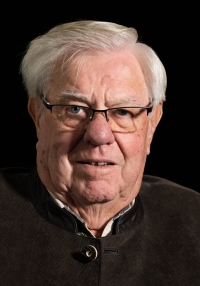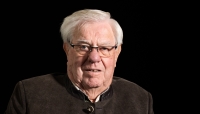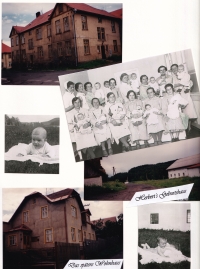"We accomplished that the streets in Göggingen were named after places from our region, such as Nejdecká, Karlovarská Street. It was all our job. Our Heimatgruppe was of the opinion that we had to establish a museum, and we succeeded. The museum in Göggingen still stands today. When Göggingen was annexed to Augsburg in 1972, we agreed in the contract that the city of Augsburg would take over the support of our activities. Unfortunately, the old Heimatgruppe disintegrated, there was no one left who would want to continue with the activities.
At that time, in fact, since 2004, I was the chairman of the working group of all associations in Göggingen (Arbeitsgemeinschaft der Gögginger Vereine und Organizations, ARGE Göggingen), a total of 38 associations with more than 15,000 members. So, I thought, it must not happen that our Heimatgruppe disappears, it and the museum must continue to exist. I was looking for people to go with me, and I found Anita Donderer, who was willing to be the cashier, and Josef Grimm, who was willing to be the chairman when I would be his deputy. So, we created a committed team that filled the partnership between Nejdek and Augsburg with life. The former Heimatgruppe did not care much for contact with the current inhabitants of Nejdek. Some even claimed that whoever goes to Nejdek their legs would have to be cut off. But we said no, we have to revive it.
Already after the Velvet Revolution, Anita and I tried to smooth the path and establish real contacts with today's Nejdek citizens. It was fortunate that the first post-revolutionary mayor was related to the subject, as his mother-in-law was a displaced German. That made it all easier for us. We also gained the support of the mayor of Augsburg, who supported this activity, and so it happened that since the revolution we have organized trips to the old birthplace. I went to Nejdek for the first time after the Velvet Revolution. I wasn't so interested before, I had a lot of other work. Then I got together with Mrs. Donderer and the initiative Children at the Time, Die Kinder von damals. When we take a bus from Karlovy Vary to Nejdek, we are completely different people, we are Nejdek people. And it's great, we just do it with our hearts. So, I believe that there is nothing wrong with that, we are just at home there. And so it should remain. After the revolution, Nejdek became the first Czech town to establish official contacts with former natives.
When we found out how badly the local home for the elderly is equipped, we organized help. With the support of the mayor of Augsburg, we contacted similar facilities in Augsburg and found out if they had equipment, they already wanted to get rid of, but which could still be useful. So, we got very good hospital equipment to Nejdek. We really filled the partnership with life, there is a lot of commitment in it."



